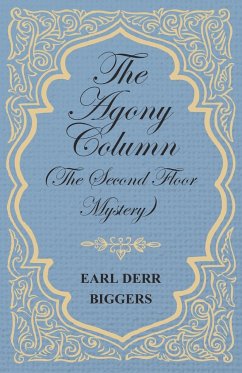This early work by Earl Derr Biggers was originally published in 1916 and we are now republishing it with a brand new introductory biography. The Agony Column (also published as Second Floor Mystery) is a romantic suspense thriller, narrated in a series of seven letters between two prospective lovers. Earl Derr Biggers was born on 26th August 1884 in Warren, Ohio, USA. Biggers received his further education at Harvard University, where he developed a reputation as a literary rebel, preferring the popular modern authors, such as Rudyard Kipling and Richard Harding Davis to the established figures of classical literature. While on holiday in Hawaii, Biggers heard tales of a real-life Chinese detective operating in Honolulu, named Chang Apana. This inspired him to create his most enduring legacy in the character of super-sleuth Charlie Chan. The first Chan story "The House Without a Key" (1925) was published as a serialised story in the Saturday Evening Post and then released as a novel in the same year. Biggers went on to write five more Chan novels and all were licensed for movie adaptations by Fox Films. These films were hugely popular with several different actors taking the lead role of Chan. They were even a success in China where the appeal of a character from the country being the hero instead of the villain appealed to film-goers. Eventually; over 40 films were produced featuring the character. Biggers only saw the early on-screen successes of Charlie Chan due to his death at the age of only 48 from a heart attack in April 1933.
Hinweis: Dieser Artikel kann nur an eine deutsche Lieferadresse ausgeliefert werden.
Hinweis: Dieser Artikel kann nur an eine deutsche Lieferadresse ausgeliefert werden.








